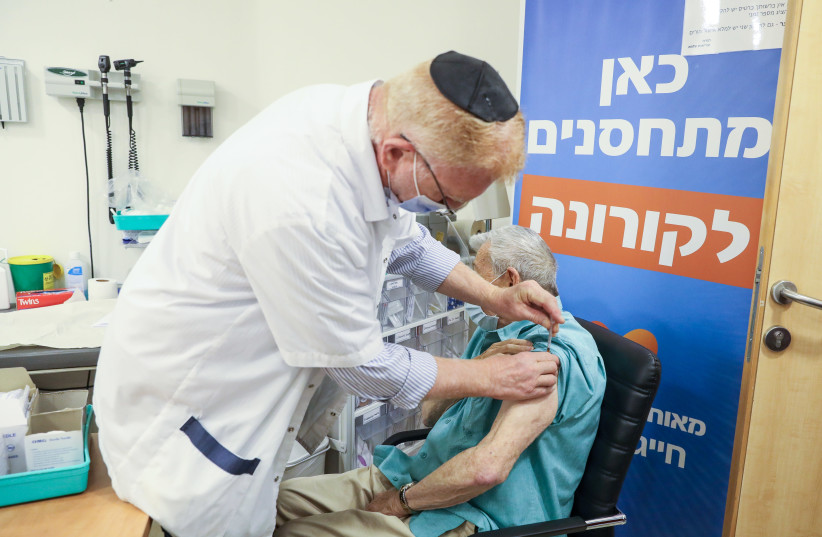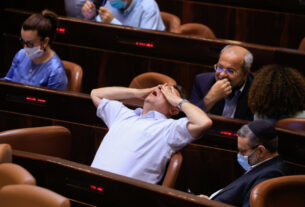The coronavirus cabinet is scheduled to meet on Sunday to vote on the details of a plan for opening the school year on September 1, as Israel lowered the age for receiving a COVID booster shot, enabling the prime minister to get the jab on Friday.
Representatives from the education sector are expected to attend the meeting and share their thoughts with the cabinet.
Last week, Education Minister Yifat Shasha-Biton said she held professional meetings with parents’ representatives, teachers, principals and heads of local authorities to prepare for the conversation.
if(window.location.pathname.indexOf(“656089”) != -1){document.getElementsByClassName(“divConnatix”)[0].style.display =”none”;}else if(window.location.pathname.indexOf(“/israel-news/”) != -1){ document.getElementsByClassName(“divConnatix”)[0].style.display =”none”; var script = document.createElement(‘script’); script.src = ‘https://player.anyclip.com/anyclip-widget/lre-widget/prod/v1/src/lre.js’; script.setAttribute(‘pubname’,’jpostcom’); script.setAttribute(‘widgetname’,’0011r00001lcD1i_12258′); document.getElementsByClassName(‘divAnyClip’)[0].appendChild(script);}
“The issue of educating our children is one of the most important and sensitive, especially in this period,” Shasha-Biton said. “Therefore, just as it is customary to vote on issues related to the economy, tourism, culture, etc., there is great importance to discussing and voting on the issue of education, as well.”
On Friday, Prime Minister Naftali Bennett shared a picture of 1.7 million rapid testing kits that had landed at Ben-Gurion Airport and will be used this week to screen children for the virus ahead of the school year.
“Our goal: To reduce the number of verified students who enter school on September 1,” Bennett wrote on Facebook. “The government sees parents as real and important partners in the fight against the Delta.”
The majority of the members of the coronavirus cabinet are in favor of opening schools on time.
“It is correct to open schools on time,” Health Ministry Director-General Nachman Ash said Saturday night in an interview with KAN News.
 Jerusalem resident Phillip Brieff is seen getting the third COVID-19 booster shot at a Meuhedet clinic, on August 1, 2021. (credit: MARC ISRAEL SELLEM/THE JERUSALEM POST)
Jerusalem resident Phillip Brieff is seen getting the third COVID-19 booster shot at a Meuhedet clinic, on August 1, 2021. (credit: MARC ISRAEL SELLEM/THE JERUSALEM POST)This is despite the fact that one-third of educational staff are still unvaccinated and despite the high level of daily COVID cases in the country – 7,761 new daily cases in 24 hours, according to the Health Ministry’s Saturday night update and 645 people in serious condition. This is the highest number of serious cases since March 10.
MK Itamar Ben-Gvir is among the sick. He was admitted to Hadassah-University Medical Center on Saturday after his COVID-19 symptoms worsened and his situation deteriorated.
His friends and followers took to Twitter to wish the MK a quick recovery.
He is the second MK to be hospitalized with the virus in the last week. MK Gilad Kariv was hospitalized at Sheba Medical Center last week but was released to home care before Shabbat. Some five MKs have been diagnosed with corona in the last two weeks.
Late Thursday, the Advisory Committee for the Corona Vaccines and Epidemic Control voted to allow all educational staff who were vaccinated more than five months ago get a booster shot, as well as people over the age of 40 and pregnant women.
Bennett was one of the first to get the jab on Friday morning at Meir Medical Center in Kfar Saba.
“If you go out to get vaccinated with the third [COVID] vaccine dose, we can avoid a fourth lockdown,” he said just before he received his booster shot.
Prime Minister Bennett received the 3rd dose of the coronavirus vaccine.
“Israel is the pioneer of the 3rd dose of the vaccines against the COVID virus. We’re seeing profound effectiveness, efficacy of the vaccines. It’s working, it’s safe and it’s the way to defeat this virus.” pic.twitter.com/ODs7UNxRXB— PM of Israel (@IsraeliPM) August 20, 2021
Middle schools and high schools, where kids over 12 can vaccinate, are almost certainly going to move forward. The government will continue to push for these teens to get the jab. So far, 40% of 12- to 15-year-olds have been inoculated with at least one shot, according to the Health Ministry, and 79% of kids 15-19.
Bennett warned in a Facebook post Saturday night that middle and high school students in red cities will need to learn from home if at least 70% of their class is not vaccinated.
“Immediately vaccinate your children,” he said. “It keeps them healthy from chronic COVID that can harm children and it allows us all a smooth school year. Those who have not yet been vaccinated will be able to do so at school.”
The cabinet will discuss two other options for students in elementary schools and preschools: Waiting to open until after Rosh Hashanah or waiting until after all of the High Holidays and opening on October 1. But, as noted, the cabinet is less likely to vote for either of these plans.
“A few weeks ago, I told the public that if we get vaccinated in the Hebrew month of Elul, we can celebrate the High Holidays with our families in Tishrei,” Bennett said. “I tell you now – it’s within reach.”
Talk of a High Holiday lockdown is beginning to distance itself from the center of coronavirus cabinet discussions as the effectiveness of the third dose is beginning to become apparent.
The reproduction rate or “R” for those people over the age of 60 who took a third shot is less than one, and there is a decline in the number of new cases, seriously ill and deaths among this cohort.
Since the start of the third booster campaign for people over the age of 60 at the end of last month, the increase in the number of patients in serious condition has started to slow down in general. The doubling rate has also dropped to every 10 days.
“We are clearly seeing the impact,” Ash told KAN, adding that it seems that the third shot will last longer than the first two – even as much as nine to 12 months before another booster is required.
“The direction is good, but we have to wait longer and see that it continues,” tweeted Prof. Eran Segal, a computational biologist from the Weizmann Institute of Science who has been advising the coronavirus cabinet. “There is one clear conclusion: Go get vaccinated.”
It is expected that the third shot will be available to everyone who vaccinated more than five months ago within the next week or two.
“Here in Israel, you can protect yourself, your livelihood, the economy, our security, the health of our children,” the prime minister said.
He added that he had instructed the health funds to open hundreds more vaccination complexes across the country to accommodate what he hopes will be an influx of people registered to get a third shot.
Over the weekend, tens of thousands of Israelis between 40 and 49 had gotten the jab through the country’s four health funds, who shared pictures of people smiling as they got inoculated in their clinics.
The health funds reported around 100,000 others had made appointments.
Dr. Sharon Alroy-Preis, head of Public Health Services, was among those who vaccinated at Clalit in Haifa on Friday afternoon.
“We are seeing profound effectiveness, efficacy, of the vaccines,” Bennett said. “It is working, it is safe, and it is the way to defeat this virus. We need all together, to work together, in order to defeat it.
“We from Israel are going to share all the data, all the insights from this pioneering [project],” he continued. “I am happy to hear that many other countries are following suit because at the end of the day this is a global war on COVID, and we have got to win.”




